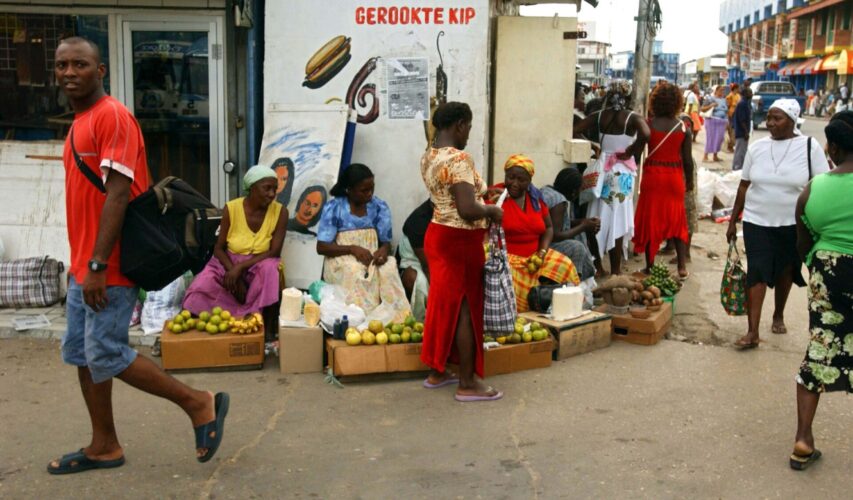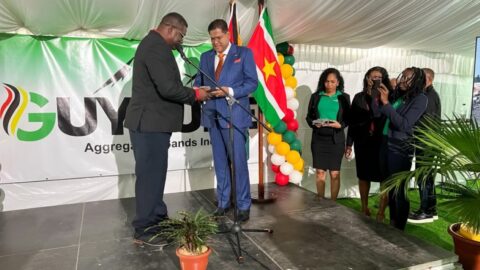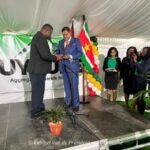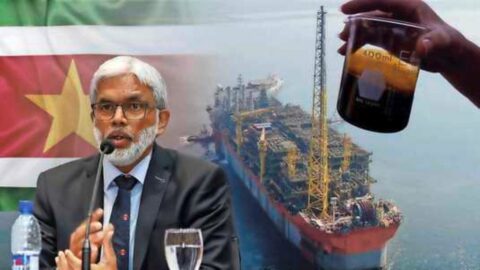China holds Suriname captive with unmanageable debts
Caught between debts and diplomacy: Suriname’s struggle under China’s economic influence
On October 20, Suriname will celebrate 170 years of Chinese immigration and their significance to the multicultural society. The ‘new’ Chinese, who started investing massively in the Caribbean since the 1990s, have now become an economic powerhouse in the former Dutch colony. China is also one of the largest creditors, leaving Suriname in a dire situation with an empty treasury and under geopolitical pressure.
What happened on February 17, 2023, in Suriname was unprecedented. A group of demonstrators stormed the parliament building in the capital city, Paramaribo, turning a peaceful protest against the Surinamese government into riots. Suriname Times Mall, a shopping center, witnessed shattered storefronts and looted shops.
The anti-government protest mobilized thousands of Surinamese citizens, expressing frustration over President Chan Santokhi’s inability to resolve the financial crisis inherited from his predecessor, Desi Bouterse. 2023 marks the third consecutive year of Suriname grappling with an inflation rate exceeding 50 percent. Particularly, the country’s poorer citizens have lost complete faith in their government, leading to a wave of anger and frustration on February 17.
Black Friday
Other parts of Paramaribo also saw looted shops, leading to February 17, 2023, being labeled ‘Black Friday’ in Suriname. Affected traders, including many Chinese, demanded financial compensation from the government, but their pleas fell on deaf ears. “With the current financial resources, the government is unable to guarantee the safety of entrepreneurs,” says Ma Xingrui, chairman of the Suriname Chinese Business Alliance (SCBA).
The safety of Chinese entrepreneurs in Suriname has long been a topic of discussion. In December of the previous year, businessman Lin Yuliang was robbed and murdered in the Surinamese interior, and a few days later, 53-year-old Chen Yuanlan was shot dead in her shop in a broad daylight armed robbery. To show solidarity, almost all Chinese shops closed their doors for half a day.
According to an estimate by The Guardian in 2015, approximately ninety percent of supermarkets and grocery stores were owned by Chinese entrepreneurs. More recent estimates are unavailable, but it is presumed that this number is even higher now.
Police Training for Chinese Retailers
To prevent a recurrence of February 17, a ‘Monitoring Team for Entrepreneur Safety’ was established, focusing on the safety of the Surinamese community, particularly Chinese entrepreneurs. In this context, 24 Chinese entrepreneurs received intensive training as Special Police Officers. After this training, they are authorized to carry weapons and make arrests if necessary.
Rodney Cairo, president of the Military Rights Position Association, has long advocated for police training for military personnel, who are currently not authorized to arrest civilians or apprehend criminals. However, his request has not been granted. “There’s a double standard. When there are problems, it’s the military who have to respond first.”
‘New Chinese’
In the 1990s, a new wave of Chinese migrants arrived in Suriname, encouraged by the policies of former Chinese President Deng Xiaoping. He transformed China’s planned economy, fully controlled by the government, into a market economy, significantly increasing prosperity in China. Many Chinese then traveled abroad for trade and established new relationships with countries in Asia, Africa, and Latin America.
China filled the void left by former colonial powers in the Caribbean. The Chinese entered Suriname when the country was suffering from extremely high inflation due to huge budget deficits, caused in part by the suspension of Dutch development aid, plummeting world market prices for bauxite and aluminum, and the Civil War that paralyzed mining.
The increase in Chinese immigration in the late 1990s was immediately noticeable in Suriname. Mandarin was spoken in the streets of Paramaribo, and large new stores sprung up everywhere. Chinese phonetic alphabets appeared on nameplates; the new shopkeepers did not speak Sranantongo, the local language. Because they were so different from the earlier Chinese immigrants, the unknown newcomers were called ‘new Chinese.’
Xingrui, chairman of SCBA, is one of them. He first came to Suriname thirty years ago. Recently, he reopened his fish processing and export business in Suriname after substantial investments. His company can now process 100 tons of fish and shrimp daily. President Santokhi attended the opening ceremony.
Xingrui has witnessed firsthand what the arrival of ‘new’ Chinese meant for the business community in Suriname. “When I first came here, there were Surinamese wholesalers. That changed about twenty years ago. Chinese supermarkets started importing their own supplies, which resulted in cost advantages,” said Xingrui. “As a developing country heavily reliant on imports, Suriname naturally opts for affordable high-quality Chinese goods.”
Wood Industry in Chinese Hands
The new Chinese also settled in locations where the ‘old’ Chinese did not venture, such as the Surinamese forest, spanning 15 million hectares. In and around villages where only Maroons, descendants of enslaved people, lived previously, Chinese not only opened shops but also invested massively in the timber industry. Suriname’s roundwood meets China’s need for resources to sustain its exponential economic growth.
The first Chinese timber companies settled in the Surinamese interior in 1997, according to research by American anthropologist Richard Price. Through the establishment of numerous subsidiaries, Chinese individuals acquired long-term concessions totaling 150,000 hectares over the years. In 2021, the official export value of timber and timber products was 67 million US dollars. The Asian market is the largest consumer of Surinamese roundwood, with China being the biggest importer.
China also leaves its mark on the gold industry, the leading cause of deforestation in Suriname. In February, Chinese company Zijin Mining Inc., also the owner of a large gold mine in neighboring Guyana, acquired the shares of Canadian gold multinational Iamgold Corp. in the Rosebel Gold Mine in northeastern Suriname.
Since the acquisition, Zijin has invested heavily in its image. In the area where many poor Surinamese live, the company organized a career fair, a speech competition, and summer jobs and scholarship programs for local youth. The company also funded a new funeral center in Marshallkreek, a village in the Surinamese interior.
Chinese Interpreters
(New) migrants from China mainly rely on each other for help. Through numerous associations and organizations like the SCBA, they unite to defend their interests. They assist new migrants from China, act as liaisons for communication with the government, provide loans, and form business partnerships.
In the Kong Ngie Tong Sang building, one of the first and largest Chinese-Surinamese associations in the country, a mobile office of the Surinamese Chamber of Commerce recently opened, with Chinese interpreters on standby. Their high level of organization gives them a strong competitive position that local Surinamese entrepreneurs currently lack.
Recent figures on the number of Chinese in Suriname are not public. During the last census in 2012, 3,567 Chinese citizens were registered. The number of people with a Chinese background in Suriname was officially 7,885, or 1.5 percent of the population of 600,000 at that time.
It is expected that the number of Chinese citizens in Suriname in 2023 is much higher than ten years
ago. According to a memo from the U.S. Embassy in April 2007, released by Wikileaks, “large groups of Chinese enter the country via the western border with Guyana and upon arrival, obtain driver’s licenses, official documents, and jobs through semi-legal or illegal channels. Unable to pay their debts, they become de facto contract laborers, bound to the organizations that brought them to Suriname.”
There is no indication that this situation has changed in recent years. Counterfeit passports are reportedly rampant, as highlighted in a passport scandal last summer, involving Chinese citizens among others.
Largest Creditor
Over the past decade, Chinese investments in Suriname received a boost under former President Desi Bouterse’s policies. Bouterse regarded China as “one of the most important and reliable development partners” of Suriname, sidelining relations with the Netherlands, the country’s largest development partner until 2010. During his presidency, the import of goods from China increased by 62.4 percent, and exports, which in 2021 consisted of 91.2 percent roundwood, rose by 844 percent. China also significantly influenced Suriname’s state finances. When Bouterse handed over the presidential sash to his successor Santokhi in 2020, he left behind an empty state treasury and a debt burden of around 4 billion US dollars. China, with 537 million dollars, is the largest bilateral creditor.
These loans were used for various projects, including the construction of social housing, new roads, a national broadband network project, the expansion of the national airport, and a new highway named after Bouterse himself: the Desiré Delano Bouterse Highway.
Debt Burden
Suriname found itself taking loan after loan from China without clear plans on how to repay them. In 2020, when Santokhi came to power, his government sought assistance from the IMF. The IMF made 688 million US dollars available for a three-year economic stabilization program. By 2024, Suriname’s debt burden is supposed to decrease from 148 to 120 percent of its GDP as part of the IMF program. To achieve this, the country must reduce subsidies on gasoline and electricity, close the budget deficit, and renegotiate debts.
While Suriname managed to negotiate with other foreign creditors, a resolution with China has remained elusive. Negotiations with the Export-Import Bank of China (Exim Bank), where the largest debt is outstanding, have been ongoing for over a year.
Under Pressure
“Suriname is like a hamburger caught in the middle of a bun,” says Chuanrui Wang, a parliamentarian from the Progressive Reform Party (VHP). “On one side, there are the United States and the IMF; on the other side, there’s China. We are being pressured by these two superpowers, and it’s harming our economic development.”
“The geopolitical game between China and America is well known, and apparently, Suriname finds itself in the middle of it,” acknowledges Eckhorst. The IMF agreement in 2021 was delayed for months due to ‘a lack of documents.’ China, one of the largest shareholders in the IMF, could not present a letter with credible and specific guarantees for debt restructuring, making it difficult for the IMF to approve the program.
“China is an important development partner, and we want to keep it that way,” says Eckhorst. He believes that China’s support for the Surinamese program within the IMF board is strong. “However, more is expected from them than what has been given so far.”
Diplomatic Solutions
To resolve this issue, Suriname is turning to politics. “It is necessary for the two heads of state to meet, and it needs to happen quickly,” says parliamentarian Wang. Albert Ramdin, the Minister of Foreign Affairs, International Business, and International Cooperation, is traveling to China next month to discuss debt restructuring. President Santokhi expects his minister to return with an agreement, though Ramdin phrases it more diplomatically. “The sooner we achieve debt relief, the sooner we can talk about further strengthening the relationship and attracting Chinese investors.” Next year, Santokhi plans to visit his Chinese counterpart, Xi Jinping, in an effort to smooth out tensions.
During the IMF program, Suriname cannot take new loans, but preparations are underway. “We want to strengthen our relationship with China in the areas of energy, education, security, and public health,” says Minister Ramdin. Santokhi is also looking forward to new investments, financed through loans from the Chinese government. Earlier this year, he established the Suriname China Investment Committee for this purpose, a presidential working group to identify and facilitate Chinese investments. In his office, Santokhi regularly meets with Chinese businessmen discussing plans for new palm oil projects, investments in infrastructure, agriculture, the timber industry, and shipping.
The question remains: what will these collaborative projects yield for the Surinamese population? Chinese infrastructure projects are mainly executed by Chinese companies employing Chinese technicians, engineers, and construction workers. The local population benefits little from employment opportunities but must still bear the financial burden of these projects.
Date: 17 oktober 2023
Categories: Economische Crisis, Economische Nieuws, Staatsschuld
Advertentie
Wilt u uw merk hier tonen?
Maak contact en ontdek de advertentiemogelijkheden!
Wilt u uw merk hier tonen?
Maak contact en ontdek de advertentiemogelijkheden!
– DISCLAIMER –
LocalContentSuriname.com is een portaal waar ondernemers, bedrijven en stichtingen zich willen presenteren. Deze website is niet verantwoordelijk voor de inhoud die op deze pagina getoond wordt. Alle informatie die op deze pagina wordt verstrekt, moet onafhankelijk worden geverifieerd. Er worden geen garanties of verklaringen gegeven voor de juistheid van de informatie. Ga naar veelgestelde vragen voor meer informatie.












